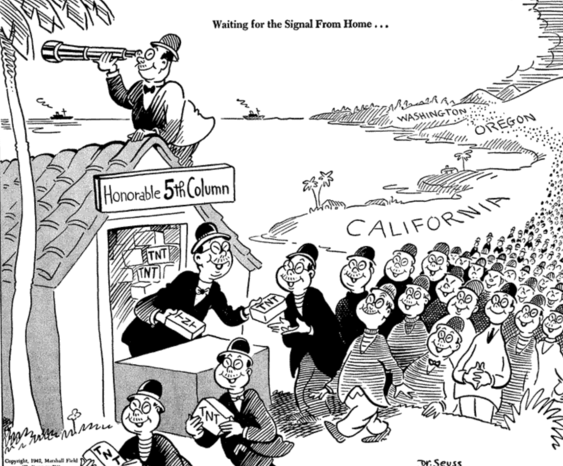
“And, now, we meet quite often,
Those empty pants and I,
And we never shake or tremble.
We both smile
And we say
‘Hi!’”
~ Dr. Seuss (What was I Scared of?)
~
March 2nd was the birthday of the well-known author, Theodore Seuss Geisel, better known as Dr. Seuss, who died in 1991 at the age of 87.
Above my couch hangs a large framed painting I did from my favorite page in his book, What Was I Scared of. It tells the story of a furry little yellow man who, in the distance, sees an empty pair of green pants walking around by themselves. Terrified, he runs. His fear grows as thoughts of encountering the green pants again make even the most mundane errands difficult. Eventually, while hiding from the pants he comes face-to-face with them.
To his surprise, the pants are just as afraid of him as he is of them and they end up becoming friends. The last page, my favorite, is an image of the little yellow man and the empty green pants walking towards each other at night, both smiling, as they say hi.
This image, as simple as it is, inspires me and makes my own fears feel a little less big. It makes me smile and slow down for a brief moment as I grab my keys and dash toward the front door.
Unfortunately, beneath the good feelings, there is guilt.
There is guilt because my stepmom, one of the warmest people I know, is Japanese American.
Seuss was not only anti-Japanese during World War II, but he was also extremely vocal about his support for Japanese internment camps, which were established through executive order by Franklin D. Roosevelt during the war. Sixty-two percent of the people in these camps were United States citizens.
My grandma and her brother Sam were born in Manzanar, one of the ten camps located within the U.S. where more than 120,000 Japanese Americans were incarcerated. When asked, my stepmom told me how her family suffered from hatred and racism during that time. They went from having a thriving garden nursery business and a place to live—to nothing. When they got out, they lived in a dirty old barn behind someone’s property.
“But right now, when the Japs are planting their hatchets in our skulls, it seems like a hell of a time for us to smile and warble: “Brothers!” It is a rather flabby battle cry. If we want to win, we’ve got to kill Japs, whether it depresses John Haynes Holmes or not. We can get palsy-walsy afterward with those that are left.” ~ Theodore Seuss Geisel (Dr. Seuss)
Placing my stepmom’s family’s history and the hate that Seuss spread side by side, leaves me in a state of shock. Having a painting that I made of his work prominently displayed in my house, brings up a multitude of mixed emotions. I love my painting, but it was painted before I knew what he stood for during the war. Should I take it down? Honestly, I don’t know.
After witnessing the aftermath of Hiroshima, Seuss did supposedly rethink his views and apologize for the statements he made via his book Horton Hears a Who, but he never actually apologized directly, which is a hard pill to swallow.
It was a difficult time in history and Seuss was far from alone in his beliefs, but can we justify separating an author, who had no problem rounding up an entire population of U.S. citizens, from his books? Is it fair to hold “Dr. Seuss weeks” in schools and not shed light into the dark corners of his life? To celebrate the work of a man who loudly called for the incarceration of citizens to which some students may actually be related?
In my opinion, if we are to embrace the good we must also shed light on the bad. To do otherwise is irresponsible.
For now, the painting above my couch will stay. It will stay because, for me, it is an important reminder to not let fear or hate triumph, as well as an opportunity to spread awareness.
~








Read 20 comments and reply